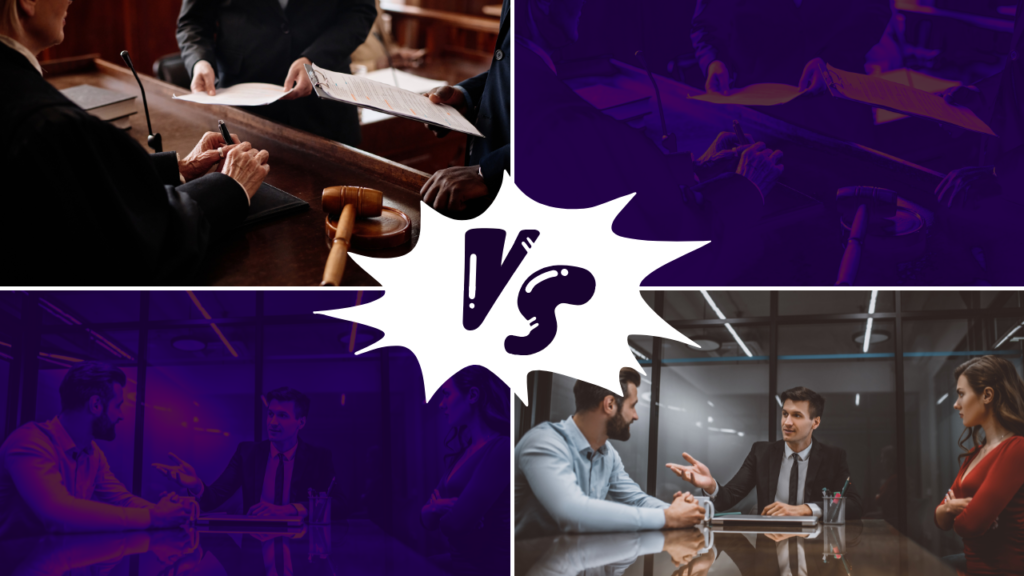
Navigating the complexities of family law can be overwhelming, especially when deciding between litigation and mediation. Both options have their unique advantages and disadvantages, which can significantly impact the outcome of your case, whether it involves divorce asset split, child custody, or spousal support. Understanding these methods in-depth can help you make informed decisions.
In this article, we’ll break down the key differences, discuss examples and scenarios, and reference the Texas Family Code to shed light on how these options are influenced by state law.
For personalized advice, please contact Attorney Tyler Monahan, partner at Turner-Monahan, PLLC, to discuss your case.
Litigation: Pros and Cons
What is Litigation?
Litigation refers to resolving disputes through the court system. It’s often necessary in cases involving contested issues, such as contested divorce, marriage asset division, or disputes over prenuptial or postnuptial agreements.
Pros of Litigation
- Legal Framework and Enforcement
Litigation is governed by strict legal procedures. Judges issue legally binding orders, making it ideal for cases involving spousal maintenance attorney services or dissolution of marriage where one party refuses to cooperate.
Example: In a contested divorce, where one spouse refuses to disclose financial assets, litigation can compel full financial disclosure under court orders.
- Suitable for High-Conflict Cases
When emotions run high, litigation provides a structured process to resolve disputes, especially in cases like family court divorce or child custody battles.
- Legal Protection for Vulnerable Parties
Victims of domestic abuse or financial coercion may find litigation more suitable because the court can protect their rights.
- Case Law Precedence
Litigation benefits from established legal precedents that attorneys can leverage for favorable outcomes. This is especially important when hiring the best divorce attorney in Fort Worth or Cleburne family law attorney to advocate for you.
Cons of Litigation
- Time-Consuming and Expensive
Court proceedings can take months or years, and legal fees can add up, making it challenging for those searching for an affordable family lawyer or divorce help.
- Loss of Privacy
Court records are public, which may expose sensitive details, unlike mediation.
- Strained Relationships
Litigation can exacerbate tensions between parties, particularly in family law practice cases involving children.
Mediation: Pros and Cons
What is Mediation?
Mediation is a collaborative process where a neutral third party facilitates discussions to help both sides reach a mutually agreeable resolution. It’s commonly used in divorce proceedings, legal separation, and cases involving family law services.
Pros of Mediation
- Cost-Effective
Mediation is generally less expensive than litigation, making it appealing for those seeking an affordable divorce attorney near me or divorce attorney free consultation.
- Faster Resolution
Mediation sessions can resolve disputes in weeks, rather than the months or years litigation often requires.
- Private and Confidential
Unlike litigation, mediation remains confidential, protecting sensitive family matters like LGBTQ divorce attorney cases.
- Better for Relationships
Mediation fosters collaboration, which is especially beneficial in co-parenting situations or when addressing paternity lawyer issues.
Example: A couple filing for divorce agrees on most issues but needs help dividing assets. Mediation allows for direct negotiation, saving time and preserving relationships.
Cons of Litigation
- Not Legally Binding Without Approval
Agreements reached during mediation must be approved by a court to become legally enforceable.
- Ineffective for High-Conflict Cases
Mediation requires cooperation, which may not work for parties with significant animosity or complex disputes.
- Limited Legal Protections
Vulnerable parties may feel pressured into unfair agreements without legal representation, highlighting the need for experienced family attorneys.
The Perspective of the Texas Family Code
The Texas Family Code provides critical guidance on both litigation and mediation in family law. Here are some key statutes that impact these processes:
Mediation and the Texas Family Code
Under Section 153.0071, the Texas Family Code emphasizes the use of alternative dispute resolution methods, including mediation, in child custody cases. It allows courts to enforce mediated settlement agreements if they meet specific legal criteria, such as being signed by all parties and attorneys.
Example: In a divorce separation lawyer case, parents may use mediation to create a child custody agreement that prioritizes the child’s best interests in compliance with Section 153.0071.
Litigation and the Texas Family Code
For litigation, Section 154.001 of the Texas Family Code governs child support, ensuring that courts determine financial support based on statutory guidelines. This provides a clear framework for resolving disputes through litigation when parents cannot agree.
Example: A couple disputes child support payments during a divorce in Tarrant County Texas case. The court uses Section 154.001 to calculate support based on the paying parent’s income and the child’s needs.
Property Division and the Texas Family Code
Property division during divorce is addressed in Section 7.001, which mandates a “just and right” division of community property. This statute plays a significant role in litigation for divorce asset split and marriage attorneys handling contested property cases.
Example: A couple undergoing a military divorce attorney case disputes the division of retirement benefits. The court applies Section 7.001 to determine an equitable split.
Which Option Is Right for You?
Choosing between litigation and mediation depends on your unique circumstances. Here are some scenarios to consider:
Litigation Scenario:
If your spouse refuses to cooperate during a dissolution of marriage and hides assets, litigation ensures that the court enforces asset disclosure and fairness in property division.
Mediation Scenario:
If both parties are amicable but have minor disagreements about child custody, mediation allows for a faster, cost-effective resolution that prioritizes the child’s well-being.
Combination Scenario:
In some cases, mediation can resolve certain issues, while litigation addresses more complex disputes. For example, mediation may finalize custody terms while litigation determines spousal support.
Turner Monahan PLLC – Here to Support You
At Turner Monahan PLLC, we specialize in family law and understand the intricacies of both processes. If you’re unsure about which path to take, our free divorce consultation Texas services can help clarify your options. Schedule a free, no-obligation consultation with attorney Tyler Monahan to discuss the details.
Disclaimer
The commentary and opinions are for informational and educational purposes only and not to provide legal advice. You should contact an attorney in your state to obtain legal advice concerning any particular issue or problem. You can become a client and enter the attorney-client privilege only after hiring Turner-Monahan, PPLC, by signing a written retainer agreement.


